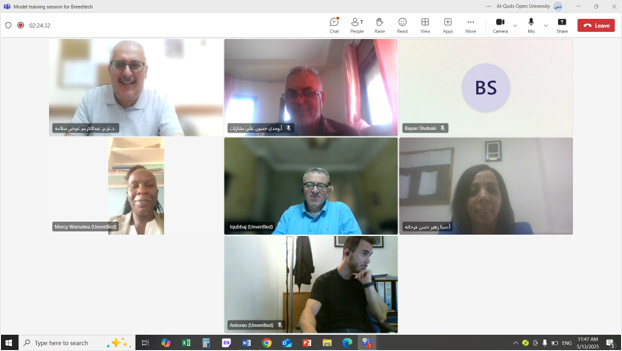The Faculty of Agriculture, in collaboration with Center for Digital Learning and Continuing Education and Community Service Center at the University held a virtual workshop on developing a Massive Open Online Course (MOOC), on Tuesday, May 13, 2025, via Zoom. This workshop brought together partners from the “Building Capacity in Plant Breeding and Biotechnology Education and Research through partnership program in Africa, Middle East and Europe for Agricultural Transformation” project.
BREEDTECH, is an Erasmus+ initiative involving ten educational institutions from Ethiopia, Kenya, Serbia, Sweden, Italy, and Palestine.
Dr. Aziz Salameh, BREEDTECH project coordinator at the University, welcomed the participants and explained that the workshop will provide an introductory overview of MOOC development, specifically in plant breeding and biotechnology for the project partners. Moreover, the workshop will demonstrate the University’s experience in MOOC production. Dr. Salameh emphasized that producing a MOOC focused on plant breeding and biotechnology is one of the main outcomes of the BREEDTECH project, aiming to disseminate and present the fundamentals of plant breeding and modern technologies to university students in partner countries in a smooth and engaging manner.
During the workshop, Mrs. Saba Farhana from Center for Digital Learning delivered a comprehensive presentation on the concept of MOOCs, their different types, practical applications, and the essential steps involved in creating compelling and effective MOOC content. Ms. Farhana also discussed with the participants the requirements needed prior to the production of MOOCs, such as finalizing the MOOC’s title, general objectives, its various components, such as content formats, types of explanatory videos, and assessment methods. At the end of the workshop, the attendees agreed on delegating the University team to prepare a MOOC draft to be shared with all partners and be adopted for MOOC production. Dr. Salameh concluded the session by commending the attendees for their collaborative spirit and active participation, which are vital for the success of the project’s various activities.




